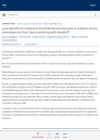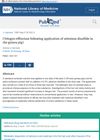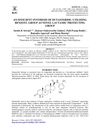 September 2024 in “Journal of the American Academy of Dermatology”
September 2024 in “Journal of the American Academy of Dermatology” Selenium disulfide shampoo effectively reduces dandruff and is well-liked by users.
 September 1980 in “PubMed”
September 1980 in “PubMed” Using selenium disulfide on guinea pigs increased hair loss.
 6 citations,
March 2011 in “Experimental Dermatology”
6 citations,
March 2011 in “Experimental Dermatology” Too much or too little selenium in the diet can cause hair loss and graying in mice.
 4 citations,
January 2016 in “Dermatology online journal”
4 citations,
January 2016 in “Dermatology online journal” Using bacitracin zinc and selenium sulfide one after the other can temporarily turn white hair yellow.
 January 2019 in “Springer eBooks”
January 2019 in “Springer eBooks” Some chemicals and drugs can cause hair loss, which usually grows back after stopping the treatment.
 1 citations,
December 2021 in “International journal of research in dermatology”
1 citations,
December 2021 in “International journal of research in dermatology” Dermatologists should learn more about shampoos to better treat hair and scalp issues.
 January 2013 in “Springer eBooks”
January 2013 in “Springer eBooks” Hair care products are important for appearance and self-esteem, and choosing the right ones can help maintain healthy hair.
 159 citations,
March 2014 in “Journal of The American Academy of Dermatology”
159 citations,
March 2014 in “Journal of The American Academy of Dermatology” Some skin medications are safe during pregnancy and breastfeeding, but others can harm the baby and should be avoided.
 73 citations,
March 2014 in “Journal of The American Academy of Dermatology”
73 citations,
March 2014 in “Journal of The American Academy of Dermatology” Most dermatologic medications are safe during pregnancy and breastfeeding, but some should be avoided due to potential risks.
 67 citations,
January 2013 in “Indian Journal of Dermatology, Venereology and Leprology”
67 citations,
January 2013 in “Indian Journal of Dermatology, Venereology and Leprology” Chronic Telogen Effluvium may resolve after years and is diagnosed by examining the patient's history and clinical signs, with treatment aimed at underlying causes and possibly minoxidil.
 67 citations,
April 2007 in “Journal der Deutschen Dermatologischen Gesellschaft”
67 citations,
April 2007 in “Journal der Deutschen Dermatologischen Gesellschaft” Shampoos are designed to clean and improve hair and scalp health, with specific ingredients for different hair types and conditions.
 41 citations,
October 2000 in “Dermatologic clinics”
41 citations,
October 2000 in “Dermatologic clinics” Better hair care products are needed to protect against grooming and chemical damage.
 20 citations,
July 2008 in “Dermatologic Therapy”
20 citations,
July 2008 in “Dermatologic Therapy” The document says that treating the root cause of hair follicle damage is crucial to prevent permanent hair loss, and treatment options vary.
 14 citations,
January 2004 in “Journal of Biochemical and Molecular Toxicology”
14 citations,
January 2004 in “Journal of Biochemical and Molecular Toxicology” Mustard gas exposure causes hair loss, but treating with N-acetylcysteine can prevent it.
 7 citations,
October 2019 in “Evidence-based Complementary and Alternative Medicine”
7 citations,
October 2019 in “Evidence-based Complementary and Alternative Medicine” Chinese medicine may help hair growth and reduce hair loss in androgenetic alopecia.
 4 citations,
September 2014 in “Elsevier eBooks”
4 citations,
September 2014 in “Elsevier eBooks” Use some skin medications with caution during pregnancy; avoid strong steroids, certain eczema treatments, and systemic retinoids, but many topical treatments and nasal sprays are safe.
37 citations,
October 2010 in “JDDG Journal der Deutschen Dermatologischen Gesellschaft” Griseofulvin is the best treatment for tinea capitis in children, but more research is needed on other treatments and safety.
 78 citations,
December 2011 in “Clinical toxicology”
78 citations,
December 2011 in “Clinical toxicology” Excessive selenium from a supplement caused toxicity but patients recovered with care.
 22 citations,
August 2019 in “Environmental research”
22 citations,
August 2019 in “Environmental research” Pseudomonas sp. T5-6-I bacteria increase selenium uptake in Brassica oleracea plants by 130%.
 1 citations,
August 2023 in “Journal of cosmetic dermatology (Print)”
1 citations,
August 2023 in “Journal of cosmetic dermatology (Print)” Too much selenium can cause hair loss and nail problems.
 13 citations,
January 2012 in “International Journal of Trichology”
13 citations,
January 2012 in “International Journal of Trichology” Eating too many paradise nuts for cancer prevention caused a woman to lose all her hair due to selenium poisoning.
 70 citations,
June 2010 in “Clinics in Dermatology”
70 citations,
June 2010 in “Clinics in Dermatology” Certain groups may need vitamin supplements to improve hair health and prevent other health problems.
26 citations,
January 2018 in “Skin appendage disorders” Thallium, mercury, selenium, and colchicine strongly cause hair loss.
4 citations,
January 2020 in “Skin appendage disorders” Toxic metals can cause hair loss and should be considered by doctors.
 4 citations,
December 2013 in “Acupuncture and related therapies”
4 citations,
December 2013 in “Acupuncture and related therapies” N-acetyl-cysteine shows promise in treating various diseases and may improve skin and hair conditions, but more research is needed on dosages and long-term effects.
 1 citations,
July 2023 in “Frontiers in Immunology”
1 citations,
July 2023 in “Frontiers in Immunology” Oxidative stress and immune dysfunction are linked to both Hashimoto's thyroiditis and polycystic ovary syndrome, with diet and specific treatments important for managing these conditions.
 April 2024 in “Skin appendage disorders”
April 2024 in “Skin appendage disorders” Environmental pollutants can damage hair health and cause hair loss.
 January 2017 in “Rasayan journal of Chemistry”
January 2017 in “Rasayan journal of Chemistry” Researchers created a new, efficient way to make Dutasteride, a hair loss and prostate drug, with high purity using a benzoyl group.
 12 citations,
January 2007 in “Current problems in dermatology”
12 citations,
January 2007 in “Current problems in dermatology” Environmental and cosmetic factors, including heat, chemicals, and sun exposure, can cause hair loss and damage.
 113 citations,
December 2000 in “The journal of investigative dermatology. Symposium proceedings/The Journal of investigative dermatology symposium proceedings”
113 citations,
December 2000 in “The journal of investigative dermatology. Symposium proceedings/The Journal of investigative dermatology symposium proceedings” KGF and activin are crucial for skin healing and repair.



























